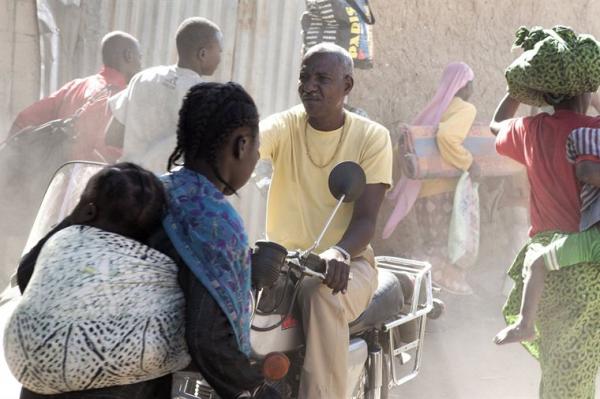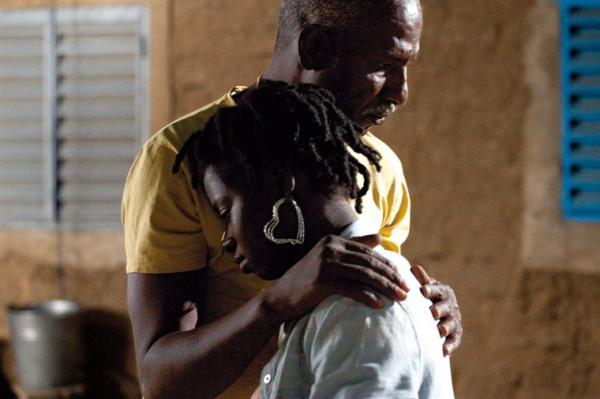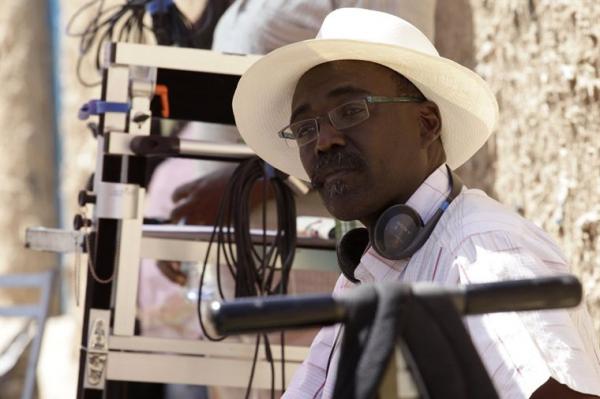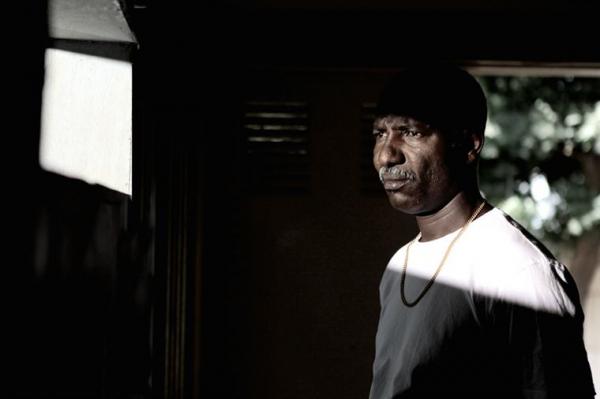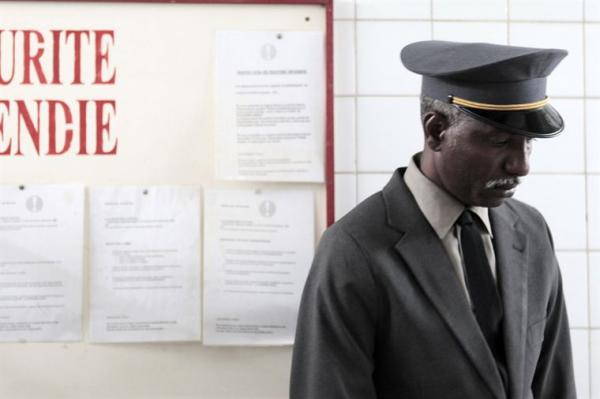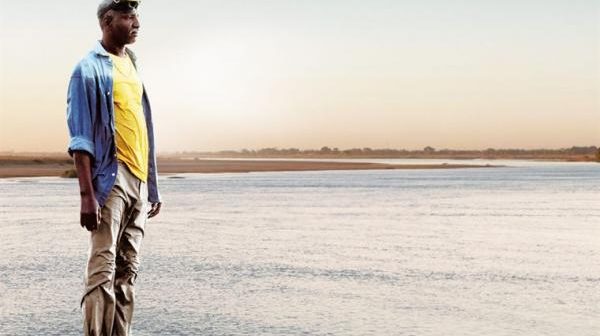A Screaming Man was shown in the Cannes Film Festival Official Selection on Sunday 16 May, 2010 and awarded the Jury Prize on 23 May.
Father and son, Adam and Abdel fool around in a pool, competing to see who can stay underwater the longest. The tension is already palpable as the son takes ages to resurface. The difference of their inscription in time is already obvious. We can guess it’s not the first time that they have competed like this. But this time it’s the son who wins, the father getting older. This son who lives in the moment, always taking photos, full of life, and who will take his father’s place in what structures his life – his position as pool attendant – this son who upsets the order of a father set in his ways, who doesn’t like his neighbour disturbing his intimacy, and who suddenly feels very old when he has to relinquish his place to his son.
The situation is not straightforward, but if the war hadn’t come and complicated their relationship, making Adam lose his head, it could have all been resolved with humour. Haroun regularly punctuates the film with comic moments which, far from weakening the dramatic content of the narrative, on the contrary heighten it. Like Hitchcock, Haroun believes in humour and triviality’s power of ampliation. Far more than a dramatic music score would have, or the crescendos of violence that Western films set in Africa cultivate so freely, tiny, seemingly innocuous details contribute most effectively to heightening the tension. A Screaming Man isn’t sombre; Adam evolves in the light, in clarity. The touches of humour bring him closer to us, and give some relief to the spectator caught up in his tension. It is a very fine line to draw, and gives us the measure of this director’s level of mastery, a director who knows just how much the little elements of life construct a narrative more effectively than pedantic explanations. Ellipses and incertitude thereby destabilize us sufficiently to keep us constantly involved.
Engaged undoubtedly, but not by ethical norms. Adam’s choices do not conform to rules or customs; on the contrary. Initially indecisive, he ends up taking action once it’s too late. Like us, he is anything but rational. But that does not absolve him of his moral responsibilities. This is the role that the filmmaker takes on: to awaken consciences, not to preach. Appealing to ethics, rather than predetermined models amounts to privileging the individual rather than the collective. Responsibility is everyone’s, whereas duties are those of the group.
A Screaming Man is thus in direct continuity with Daratt, Haroun’s previous film. Rather than letting himself get trapped in the commonly accepted norms, such as vengeance or pardon, the young Atim asserted his own free will, thereby establishing himself as a thinking, acting individual, his own inventiveness being the only hope of escaping the vicious circle of violence. Adam does not play by the rules either. He doesn’t calculate. He is quite simply human, in his weaknesses and his beauty, capable of the worst as he is the sublime. Which is not without its ambivalence and guilt.
Adam bears the name of the first man on earth, and it is indeed this relationship to the origin that is in question. The paradigm of the father-son relationship is nonetheless considerably different to that which Souleymane Cisse depicted in Yeelen, for example. If the father in both cases fears that his son will take his place, Cisse portrayed this archetypal opposition as embodying a fatal breakdown in transmission. In A Screaming Man, Adam and Abdel are the best buddies in the world. They complement one another looking after the pool until the new Chinese owner of the hotel plays them off against each other. It’s only when military-dictatorial arbitrariness, incarnated by the District Chief (Emil Abossolo Mbo), combines with that of globalization and economic rationalization that things go awry. He whom everyone calls « Champ » turns out to be impotent, in the image of the cook, David, who is powerless too to fight against Goliath. From simply feeling old, Adam is confronted with a considerably more dramatic Cornelian dilemma, but in both cases his range of choices is economically limited.
Haroun’s force was to make this a question of moral conscience, whereas Cisse portrayed it as a question of duty, denouncing a father who, in his refusal to convey his magical knowledge to his son, became a vital threat to him. This represents a major evolution in African film: it is no longer a question of reminding man of his duties to guarantee a future for the community (this independence in the making which is difficult to evaluate 50 years on), but of placing each and everyone before his/her own responsibilities in a world that is becoming harsher (and in full awareness of this sad state of affairs). This passage from a people to the world engenders both an individualization of the issues and a new aesthetic, in touch with the realities of today’s African societies. This empiricism infuses the entire film: it combines the economic weight of rampant globalization with army/police controls and the racketing of the poorest. But it is also, in the case of Chad and countries that are at war, the panic of a population left vulnerable by the seriousness of the threat that weighs on their own survival. How is man to behave in such a world in order to preserve his integrity?
People often put their fate in the hands of God, but this isn’t the solution: « Our problem is that we put our destiny in God’s hands », says David bitterly. It is indeed in the here and now of a consciousness of the state of things that one should look. In this respect, although Haroun refrains from imposing anything, he is as much a realist as Sembene who offered the spectator ethical guidance in the face of corrupt authorities, patriarchy, and obsolete traditions. His characters are full of contradictions and profoundly human. They are never models or heroes to identify with. They are the play of the forces present, and quite simply try to get by in a violent world, faced with issues that they can attempt to master, if they have the courage. That, precisely, is the crux of the matter: finding the courage, which is what Adam finds so difficult.
Haroun’s aesthetic is thus in all respects more open. The narrative does not end on a conclusive note, but lets life continue, for it remains to be reinvented: Djeneba is expecting a baby, a coming generation that Adam and his wife Mariam have already opened their arms to, and that Adam will manage to love now. Djeneba restores time, which had come to a standstill. This aesthetic openness also lies in the confidence in the power of the image, which is always meaningful, dialogues being scarce as they are in the film. A magnificent tracking shot down a corridor follows Adam and his friend, David the cook, as they discuss their concern about the war. The more trapped Adam becomes, the more he is filmed in interiors, in narrow streets or in front of walls. In his final excursion, the shots broaden out. The sound track is completely minimalist, often silent, making the sounds of the menacing war – sirens, artillery fire – more perceptible in the background. The radio punctuates the day-to-day tension. Poetically, the film evokes rather than states: the light, frames, chromatic unity, shot composition, and a composed rhythm conjointly amplify the filmic discourse. Perspectives heighten what is felt, perceived, like the vanishing lines of the reed hangings as Adam watches Djeneba sing, an infinitely sad song that it would have been superfluous to translate. The viewpoint speaks in the place of the character, like when, through the curtains, Adam watches the soldiers grabbing his son, Abdel framed by the right-hand window, his crying wife by the left-hand one.
Touches of humour constantly contribute to opening this frame, reminding us that the theatre of life is thus, like in the delightful fixed shot of the family meal in which father and son only speak to one another when the mother has to leave the scene. Haroun makes the most of the wonderful Marius Yelolo’s brio, whose skills he already largely used in his television drama, Sex, Okra and Salted Butter; David the cook thus gives a tragicomic echo to the character Adam, whom Youssouf Djaoro plays with an impressive interiority, on a par with his performance in Daratt, in which played a former torturer turned paternal figure.
Haroun’s cinema may seem to veer towards pessimism in its increasingly heightened awareness of the difficulties of the world. A Screaming Man and Expectations end more tragically than Bye Bye Africa and Abouna. But it is never overwhelming. There are tears on several occasions in A Screaming Man, but always with discretion, in a film that isn’t afraid to show them, like in the impressive zoom in that reveals Adam’s watery eyes. The characters cry alone, on a screen that becomes veiled, for these tears are cries in a space in which cries are not heard. The African man’s cry is lost in the desert of indifference or, worse still, in the contemptuousness of stereotypes. A screaming man is not a dancing bear: in the image of Cesaire’s incisive words, this film is a stone thrown in the mire of paternalism, compassion, and misunderstandings to restore the consciousness of an African man fighting to not lose his footing before the violence done to him. This original man does not adopt the posture of victim, but one of human depth and dignity, in the image of all men. Haroun develops such maturity, such mastery here, and in such simplicity, that the contemporaneity of his message imposes itself without him having to overstate it. A Screaming Man is a major work, which forcefully contributes to inscribing the African man in a humanity that has been, and still so often is, refused to him.
///Article N° : 9494
